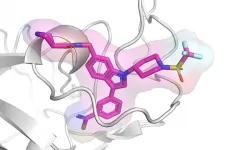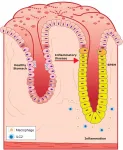Few realistic scenarios left to limit global warming to 1.5°C
2021-05-14
(Press-News.org) Of the over 400 climate scenarios assessed in the 1.5°C report by the Intergovernmental Panel on Climate Change (IPCC), only around 50 scenarios avoid significantly overshooting 1.5°C. Of those only around 20 make realistic assumptions on mitigation options, for instance the rate and scale of carbon removal from the atmosphere or extent of tree planting, a new study shows. All 20 scenarios need to pull at least one mitigation lever at "challenging" rather than "reasonable" levels, according to the analysis. Hence the world faces a high degree of risk of overstepping the 1.5°C limit. The realistic window for meeting the 1.5°C target is very rapidly closing.
If all climate mitigation levers are pulled, it may still be possible to limit global warming to 1.5°C in line with the Paris Agreement. The findings could help inform the heated climate policy debate. "The emission scenarios differ in their reliance on each of the five mitigation levers we looked at. Yet all scenarios that we find to be realistic pull at least several levers at challenging levels," says lead author Lila Warszawski from the Potsdam Institute for Climate Impact Research (PIK). "None of the realistic scenarios relies on a single silver bullet."
All realistic scenarios pull all five levers
"The energy sector is key to the 1.5°C target of course, with on the one hand reduction of energy demand and on the other decarbonisation of energy use and production," says Warszawski. "Yet we can't do away with the other strategies. Removing carbon dioxide from the atmosphere and for instance storing it underground also proves to be almost indispensable. Land use must become a net carbon sink, for instance by re-wetting peatlands or afforestation. Finally, emissions of the powerful greenhouse gas methane must be cut from animal production, but also from leaks in oil and gas extraction. This is quite a list."
The researchers drew from existing research to define bounds that delineate between the 'reasonable', 'challenging', and 'speculative' use of each of the levers by mid-century. The bounds quantify the range of emissions reduction potentials of each of the aggregate levers, which result from technological, economic, social and resource considerations. They can then be translated into contributions to keep warming at 1.5°C with no or low temperature overshoot.
A triple challenge for humanity
"This calls for an immediate acceleration of worldwide action to reduce greenhouse gas emissions by all available means," says co-author Tim Lenton from Exeter University. "We need a sustainability revolution to rival the industrial revolution. Otherwise those most vulnerable to climate change are going to bear the brunt of missing the 1.5°C target. This is a system-wide challenge - piecemeal actions and rhetorical commitments are not going to be enough."
"Humanity is facing a triple challenge to stabilize global warming without significantly overshooting the 1.5°C commitment" says co-author Nebojsa Nakicenovic from the International Institute for Applied Systems Analysis, IIASA. "First is to half global emissions every decade requiring a herculean effort and a decarbonization revolution by phasing-out fossil energy, a quantum leap in efficiency and sufficiency, and climate-friendly behaviors and diets; second to pursue nature-friendly carbon removal through afforestation and land-use change; and third to assure safe operating of Earth systems that now remove half of global emissions from the atmosphere."
Unrealistically optimistic scenarios over-estimate e.g. carbon capture and storage potentials
Those scenarios classified by the analysis as unrealistically optimistic most frequently tend to over-estimate carbon capture and storage potentials, while others over-estimate energy consumption or reduction of non-CO2 greenhouse gases like methane. Still others make all too bold assumptions about dietary changes towards more plant-based food or about limited population growth.
The authors also took a closer look at the scenarios provided by the International Energy Agency (IEA) in 2018 and the one called 'Sky' produced by the Shell oil and gas company. Both scenarios foresee net emissions falling to zero globally as late as 2070. The researchers found that they do not lie within the corridor of carbon dioxide emissions over the next century that seems to offer a realistic chance of meeting the 1.5°C target. The Shell Sky scenario shows emissions levels in 2030 well above other scenarios considered in this study.
"The Shell Sky scenario has been called a pie in the sky, and that's indeed what it is," says co-author Gail Whiteman from the University of Exeter's Business School. "From a science perspective, this is quite clear. In the business community some still like it because it seems to offer, in comparison to other scenarios, a relatively easy way out of the climate crisis. Our analysis shows, however, that there are no easy ways out."
Irrespective of the specific climate target rapid emission reductions are key
"The necessary emissions reductions are hard to achieve, technically but also politically. They require unprecedented innovation of lifestyles and international cooperation," concludes co-author Johan Rockström from PIK. "I understand anyone who thinks we might fail the 1.5°C target. Also, it is clear that irrespective of the specific climate target rapidly implementing strong emission reductions is key now. Yet I think limiting warming at 1.5°C is worth just every effort because this would limit the risk of giving some tipping elements in the Earth system an additional push, such as ice sheets or ecosystems like the Amazon rainforest. As technical as this all might sound, it really is about assuring a safe climate future for all."
INFORMATION:
Article: Lila Warszawski, Elmar Kriegler, Timothy M. Lenton, Owen Gaffney, Daniela Jacob, Daniel Klingenfeld, Ryu Koide, María Máñez Costa, Dirk Messner, Nebojsa Nakicenovic, Hans Joachim Schellnhuber, Peter Schlosser, Kazuhiko Takeuchi, Sander van der Leeuw, Gail Whiteman, Johan Rockström (2021): All options, not silver bullets, needed to limit global warming to 1.5°C: a scenario appraisal. Environmental Research Letters [DOI:10.1088/1748-9326/abfeec]
Weblink to the article: https://iopscience.iop.org/article/10.1088/1748-9326/abfeec
For further information please contact:
PIK press office
Phone: +49 331 288 25 07
E-Mail: press@pik-potsdam.de
http://www.pik-potsdam.de
Who we are: The Potsdam Institute for Climate Impact Research (PIK) is one of the leading research institutions addressing relevant questions in the fields of global change, climate impacts and sustainable development. Natural and social scientists work closely together to generate interdisciplinary insights that provide a sound basis for decision-making for society, businesses and politics. PIK is a member of the Leibniz Association.
ELSE PRESS RELEASES FROM THIS DATE:
2021-05-14
The protein made by the ASH1L gene plays a key role in the development of acute leukemia, along with other diseases. The ASH1L protein, however, has been challenging to target therapeutically.
Now a team of researchers led by Jolanta Grembecka, Ph.D., and Tomasz Cierpicki, Ph.D., from the University of Michigan has developed first-in-class small molecules to inhibit ASH1L's SET domain -- preventing critical molecular interactions in the development and progression of leukemia.
The team's findings, which used fragment-based screening, followed by medicinal chemistry and a structure-based design, appear in Nature Communications.
In mouse models of mixed lineage leukemia, the lead compound, known as AS-99, successfully reduced leukemia progression.
"This ...
2021-05-14
Organizing functional objects in a complex, sophisticated architecture at the nanoscale can yield hybrid materials that tremendously outperform their solo objects, offering exciting routes towards a spectrum of applications. The development in synthetic chemistry over past decades has enabled a library of hybrid nanostructures, such as core-shell, patchy, dimer, and hierarchical/branched ones.
Nevertheless, the material combinations of these non-van der Waals solids are largely limited by the rule of lattice-matched epitaxy.
A research team led by professor YU Shuhong at the University of Science and Technology of China (USTC) has reported a new class of heteronanostructures they ...
2021-05-14
After the p53 tumour suppressor gene, the genes most frequently found mutated in cancer are those encoding two proteins of the SWI/SNF chromatin remodelling complex. This complex's function is to "accommodate" the histones that cover the DNA of the chromosomes so that the processes of transcription, DNA repair and replication or chromosome segregation can occur, as appropriate. A group from the University of Seville has demonstrated at CABIMER that the inactivation of BRG1, the factor responsible for the enzymatic activity of the SWI/SNF complexes, leads to high genetic instability, a characteristic common to the vast majority of tumours.
This study's most important contribution is that it deciphers the mechanism by which this occurs. The SWI/SNF complex ...
2021-05-14
Yoga and breathing exercises have a positive effect on children with attention deficit hyperactivity disorder (ADHD). After special classes, children improve their attention, decrease hyperactivity, they do not get tired longer, they can engage in complex activities longer. This is the conclusion reached by psychologists at Ural Federal University who studied the effect of exercise on functions associated with voluntary regulation and control in 16 children with ADHD aged six to seven years. The results of the study are published in the journal Biological Psychiatry.
"For children with ADHD, as a rule, the part of the brain that is responsible ...
2021-05-14
The COVID-19 lockdown was a catalyst for many older people to embrace technology, reconnect with friends and build new relationships with neighbours, according to University of Stirling research.
Understanding the coping mechanisms adopted by some over 60s during the pandemic will play a key role in developing interventions to help tackle loneliness, isolation and wellbeing in the future.
The study, led by the Faculty of Health Sciences and Sport, surveyed 1,429 participants - 84 percent (1,198) of whom were over 60 - and found many had adapted to video conferencing technology to increase ...
2021-05-14
High-precision noble gas analyses indicate that solar wind particles from our primordial Sun were encased in the Earth's core over 4.5 billion years ago. Researchers from the Institute of Earth Sciences at Heidelberg University have concluded that the particles made their way into the overlying rock mantle over millions of years. The scientists found solar noble gases in an iron meteorite they studied. Because of their chemical composition, such meteorites are often used as natural models for the Earth's metallic core.
The rare class of iron meteorites ...
2021-05-14
A new analysis of the effects of SARS-CoV-2, the virus causing the current pandemic, on the human body has provided novel insights into the nature of resilience and how we deal with stressful situations. Using COVID-19 as an example, the findings provide a new framework that may be central to managing this disease, minimise the likelihood of ferocious viral outbreaks in the future and deal with other major stresses.
"COVID-19 has been a huge burden on society at all levels. Whilst the prospects are improving in countries with efficient vaccination schemes ...
2021-05-14
UNIVERSITY PARK, Pa. -- Mother fence lizards that experience stress during pregnancy give birth to male offspring with shortened telomeres, or bits of non-coding DNA that cap the ends of chromosomes, according to a Penn State-led study. Shorter telomeres are associated with decreased lifespan in humans; therefore, the team's findings may have implications for human longevity.
"Human men have shorter telomeres than women, which may partly explain why they have shorter lifespans of about seven years," said Tracy Langkilde, professor and Verne M. Willaman dean of the Eberly College of Science. "Our study shows that stress experienced by mothers during gestation could further shorten the telomeres, and therefore the lifespans, of their sons, thereby exacerbating these sex differences." ...
2021-05-14
Increasingly, businesses rely on algorithms that use data provided by users to make decisions that affect people. For example, Amazon, Google, and Facebook use algorithms to tailor what users see, and Uber and Lyft use them to match passengers with drivers and set prices. Do users, customers, employees, and others have a right to know how companies that use algorithms make their decisions? In a new analysis, researchers explore the moral and ethical foundations to such a right. They conclude that the right to such an explanation is a moral right, then address how companies might do so.
The analysis, by researchers at Carnegie Mellon University, appears in Business Ethics Quarterly, a publication of the Society for Business Ethics.
"In most cases, ...
2021-05-14
Scientists at the National Institutes of Health determined that stomach inflammation is regulated differently in male and female mice after finding that androgens, or male sex hormones, play a critical role in preventing inflammation in the stomach. The finding suggests that physicians could consider treating male patients with stomach inflammation differently than female patients with the same condition. The study was published in Gastroenterology.
Researchers at NIH's National Institute of Environmental Health Sciences (NIEHS) made the discovery after removing adrenal glands from mice of both sexes. Adrenal glands produce glucocorticoids, hormones that have several functions, one of them being suppressing inflammation. With no glucocorticoids, the female mice soon ...
LAST 30 PRESS RELEASES:
[Press-News.org] Few realistic scenarios left to limit global warming to 1.5°C




